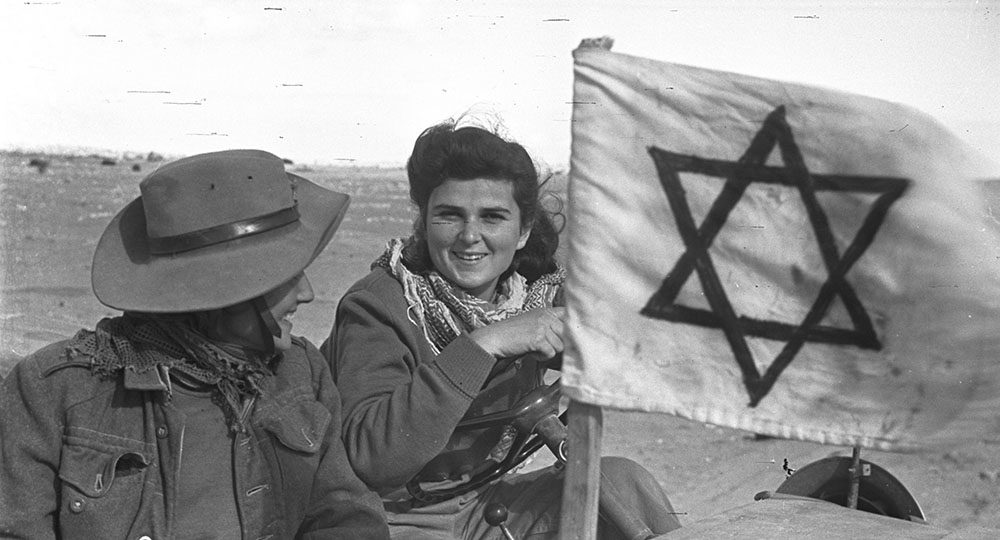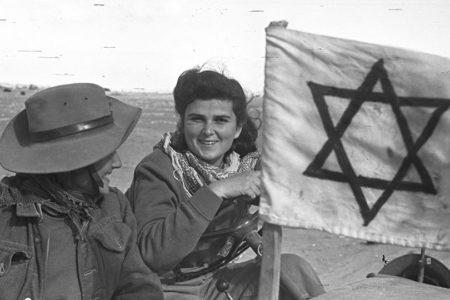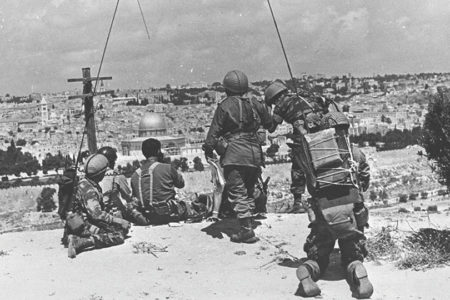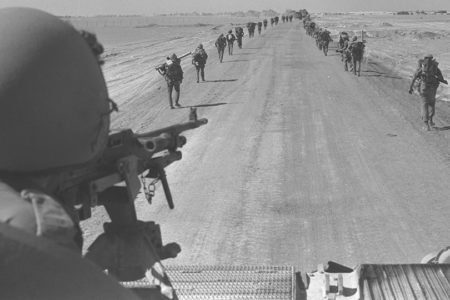Israel’s 1948 War Of Independence
A Miracle In The Middle East
In a few months, the State of Israel will commemorate fifty years of modern statehood. No nation in the history of mankind has been born out of such enormous suffering. And certainly no nation has surpassed Israel in the perpetual struggle to survive against seemingly insurmountable odds.
The Holocaust of World War II plunged the Jewish people into the depths of national despair. Six million dead left a pall of trauma and uncertainty upon the face of world Jewry. That an Adolf Hitler could practice such unbridled barbarism in the 20th century—and take a civilized nation with him—was beyond comprehension. At the same time, the sheer horror of the Holocaust brought a sense of urgency to the need for a Jewish homeland. Jews, and a few friends in the international community, dared to believe that it was time to take the leap toward creating a Jewish state envisioned by Theodor Herzl and early Zionists. Hopefully, it would be a place where Jewish children could sleep in peace, free from the smell of crematoriums and the shrieks of the dying.
With the dawn of May 15, 1948, came the realization that Jewish people had dreamed of for centuries. The State of Israel was miraculously reborn. But there were clouds on the horizon, and the tiny nation, fresh from the rigors of the Holocaust, had precious little time for celebration. The birth of Israel was accompanied by the thunder of guns. Its enemies in the Arab world were set to annihilate the fledgling state and drive the Jews into the sea.
Not Without Friends
Israel was not alone in preparing for the first in a succession of wars. Fortunately, there were true friends of Israel, many of whom were Christians, ready to do everything in their power to aid the Jews in their climactic struggle to survive. But for all their help, it was left to the Jewish people themselves to fight for the right to live in the land of their fathers.
It was probably best said by an exceptionally good friend of Israel, Orde Wingate, a Christian who did more than just agree that a homeland for the Jewish people was a good idea. The young British officer put his Zionism into practice by teaching immigrants how to defend themselves against their foes.
“This is the cause of your survival. I count it as my privilege to help you…But remember that this is your battle. My part, which I say I feel to be a privilege, is only to help you.”
It was, indeed, their battle. David Ben-Gurion, who later became Israel’s first Prime Minister, responded to the counsel of American General George Marshall to Jewish leaders. Marshall, then Secretary of State, suggested a delay in announcing statehood until a more favorable time.
“Here then,” Ben-Gurion declared, “was the counsel of a friend and the military appreciation of our situation by one of the world’s outstanding soldiers. On the face of it, such advice could not be dismissed lightly. Yet it could not deflect us from our chosen course. For Marshall could not know what we knew—what we felt in our very bones: that this was our historic hour; if we did not live up to it, through fear or weakness of spirit, it might be generations or even centuries before our people were given another historic opportunity—if indeed we would be alive as a national group.”
To Live or to Die
Ben-Gurion’s resolve was soon tested to the full. With nothing at their backs but the sea, remnants of Jewish people—many survivors from the furnaces of the Holocaust—entered another trial by fire. In a place where Jews had been put to death on the floors of ancient arenas, a new generation fought for their lives. There was no turning back.
Egyptians, Syrians, Iraqis, the Transjordanian Arab Legion, and the Arab Liberation Army fused their forces and swept into Israel intending to put the infant nation to death. For nearly a month, the contest raged over the length and breadth of the land. Jewish forces—initially with a tank, fighter plane, or field gun—suffered heavy casualties, but they held. On June 11, in response to an initiative by the United Nations, a truce was called.
When the truce expired on July 9 and fighting resumed, the Arabs experienced a rude awakening. During the truce, the Jewish forces had managed some incredible feats in securing and transporting vital military supplies into the country. The day before the truce expired, Egyptian troops renewed their attacks on the southern front. The Israelis were ready for them. Strong fortifications and mobile commando units met them head-on. Within ten days, the Egyptians were defeated and found much of their military equipment in Jewish hands.
The Arab Liberation Army and their comrades in arms fared no better than the Egyptians. They were driven back into Lebanon. Soon Arabs in Cairo and Damascus were hearing the drone of Israeli bombers in the skies above their cities. It was something the Arabs had not expected, nor were they prepared to accept it. They sued for a cease-fire.
By January 7, 1949, all hostilities concluded. The War of Independence was over. The State of Israel was now a fact. Jewish forces paid a high price for the survival of their homeland. Some four thousand soldiers and two thousand civilians had been killed. Financially, they had taken a heavy blow—$500 million. But the state was intact. Little Israel was at center stage. Fifty years later, it is still in the international spotlight.
At the first meeting of the Provisional Council of State, Chaim Weizman, Israel’s first President, summed up the import of the birth of the nation.
“This is a great day in our lives. Let it not be regarded as undue arrogance if we say that it is also a great day in the life of the world. There is recompense for a righteous struggle. If we, the suffering and wretched people, impoverished and downtrodden, have been privileged to celebrate this occasion, there is hope for all those who aspire for justice and righteousness.”
His words had the ring of the voices of the prophets.
O Jerusalem
“If I forget thee, O Jerusalem, let my right hand forget her cunning. If I do not remember thee, let my tongue cleave to the roof of my mouth, if I prefer not Jerusalem above my chief joy” (Ps. 137:5–6).
It is impossible to rationally assess the love for Jerusalem embodied in the Jewish people. It is equally difficult to fully compute the anxiety felt when the War of Independence ended and the Old City was firmly in the hands of the Transjordanian Arab Legion. Following the war, Jewish people were ecstatic over the establishment of the State of Israel. Yet, for all of their astonishing accomplishments, a satisfactory result could never be registered so long as the Jordanians held their beloved city. Israel was a nation whose heart was held by another.
Palmach troops had been within the walls for a brief time during the battle for Jerusalem. They were forced to leave, however, when it became apparent that they were no match for the Jordanians. For 19 bitter years thereafter, Jews were denied access to their homes, places of worship, and, above all, the sacred Western (Wailing) Wall. All of that changed on a June day in 1967.
A Cup of Trembling
Across the decades since the War of Independence, Israel has been confronted by the constant threat of attack by their enemies. Five times since the state was born Arab nations have chosen the military option in attempting to finish what they started so poorly in 1948. Each time they have failed. But what they could not accomplish on the field of battle, they feel they have done in the corridors of the United Nations. A recent vote taken at the United Nations exhibits two forces at work.
In a special session of the General Assembly, UN members voted 131 to 3 to condemn Israel for refusing to halt construction of the Har Homa housing project south of Jerusalem. This, despite the fact that two-thirds of the land on which the project is being built is owned by Jews. Also, the members failed to utter a word about the construction being done by Palestinians, to which Israel has raised virtually no objections.
This is, of course, what we have come to expect from a world body that time after time has leaped on board with anti-Semites and Israel-bashing politicians. To state the case simply, the United Nations is anything but United Nations—except when it comes to ganging up on Israel.
What is happening on the banks of the East River in New York is only a confirmation of past history and a future prospect. As a matter of fact, this vote sheds significant light on a portion of prophetic revelation that cannot be denied.
“For I will gather all nations against Jerusalem to battle” (Zech. 14:2a, italics added). “Behold, I will make Jerusalem a cup of trembling unto all the peoples round about, when they shall be in the siege both against Judah and against Jerusalem” (Zech. 12:2).
Today the United States stands firmly with Israel in these decisive confrontations. We can all be thankful for that. The day will come, however, when there will be no friend to help—save one.
When Israel stands alone before those bent on their destruction, their help will come from the Lord, who will reconcile the nation and deal with their satanically driven foes.
“Then shall the Lᴏʀᴅ go forth, and fight against those nations, as when he fought in the day of battle” (Zech. 14:3).
He will indeed, and Israel will at last know, in full measure, His lasting peace.







Prophecy being fulfilled every day! 🙏🙏🙏✝️♥️